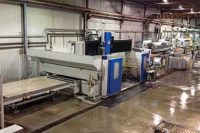
Bramagran Brasileiro Marmore e Granito Ltda. of Castelo, Espírito Santo, Brazil, processes blocks of material from its own quarry sites as well as others, including an increasing amount of exotic materials.
Beyond the coffee fields and mountains of Brazil’s southern Espírito Santo State lies the town of Castelo, where Bramagran Brasileiro Marmore e Granito Ltda. has been processing stone since 1990. And over the past two decades, the company has shown progressive expansion in material selection and processing equipment.

Bramagran has eight Cimef gangsaws at the main factory, and there are four additional gangsaws at a separate cutting facility to serve the local market.
Over the past decade, Bramagran has continued to expand and invest, adding gangsaws and automated multi-head polishing lines. Today, the company has eight Cimef gangsaws at the main factory, and there are four additional gangsaws at a separate cutting facility to serve the local market.

A total of 17 of Bramagran’s materials are extracted from company-owned quarries, including Golden Lapidus, Royal Brown and Sunshine.
Slabs are treated with resin, and due to the company’s broad selection of unique materials, the most effective method is to apply the resin by hand and then allow the slabs to cure in driers from Rosh Industrial.

Bramagran also offers materials with a brushed finish, such as Pictor.
There are a total of 140 workers in the factory and 160 in the quarries. A total of 17 materials from Bramagran are extracted from company-owned quarries.

The latest MGM polishing line was added this past November, and each one is equipped with 20 polishing heads for optimal efficiency.
Sales and Marketing
Bramagran classifies materials into three main categories: “Classic,” “Exotic” and “Super Exotic.” In the area of Super Exotics, the company has developed a special viewing area within the warehouse specifically for these materials.This shift towards exotic materials represents an expansion in the buying tastes of Bramagran’s customers from earlier this decade. “Even a few years ago, people wanted Classics more than anything else,” explained Rafael Mello, Export Manager for Bramagran. “We are now moving towards Exotics and Super Exotics. We really added a lot more in the last year. Our customers were asking for exotics, so we really made an effort.”

The company has three automated slab polishers from MGM.

The latest MGM polishing line was added this past November, and each one is equipped with 20 polishing heads for optimal efficiency.
Approximately 90% of Bramagran’s exports go to the U.S., and the company sells primarily to distributors, according to Mello, who added that the company’s distribution is well spread across the U.S. “We have good coverage on the East Coast, and Texas has been a good market for us,” Mello said. “Most of the 3-cm markets we deal with have been holding up okay, but some of the 2-cm markets, like Miami and California, are slow.”

Slabs are treated with resin, and due to the company’s broad selection of unique materials, the most effective method is to apply the resin by hand and then allow the slabs to cure in driers from Rosh Industrial.
In addition to the U.S., Bramagran exports materials to Venezuela, and it has also begun exporting to Dubai and Russia.

Bramagran has dedicated an area of its warehouse specifically to “Super Exotic” materials.
Bramagran will be present at Coverings 2009, which is set to take place in Chicago, IL, from April 21 to 24.

Royal Brown
Additional Product Photos

Sunshine



